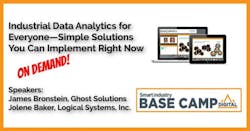Base Camp Digital Presenters: Getting started with data analytics
Getting started with data analytics.
That’s a big hurdle for many in the manufacturing space. And while it can seem daunting to some, it shouldn’t, according to Jolene Baker and James Bronstein. This wife/husband pair (she is a senior manufacturing-intelligence specialist with Logical Systems, Inc.; he is a principal engineer with Ghost Solutions) touch on data opportunity, Frankenstein fix-its and data-reporting bottlenecks in the Q&A below. And they present the on-demand Base Camp Digital webinar "Industrial Data Analytics for Everyone—Simple Solutions You Can Implement Right Now." Take a look…
Smart Industry: Describe the working partnership between you two / your companies.
Jolene & James: James uses engineering/process expertise to seek out and interpret process-production influencers and how they interact with each other and within the system. He uses his many years of experience in a range of facilities to quickly identify the usual (and sometimes unusual) suspects of process upset or opportunity. Utilizing a process expert is key to understanding correlations, causality, and positive/negative indicators.
After James has identified issues and opportunities, Jolene works to integrate, automate and/or visually present the new intelligence using a variety of tools. She identifies correlations and indicators and works with James to filter any probable cause-and-effect relationships, then validates them. After this validation, visualization and automation are finalized and she works with James to complete an operational rollout to instruct the facility on how to apply the intelligence in real time and reap the benefits.
Smart Industry: What is one critical thing people must know to get started with data analytics?
Jolene & James: Keep an “operating” end goal in mind. Data and analytics are useless until the intelligence they are designed to provide is operational. Making any intelligence “operational” means that it is adopted, trusted and becomes the new normal.
Smart Industry: What is a common misconception about data analytics in the industrial space?
Jolene & James: Data tools will not create intelligence on their own. Purchasing a data warehouse, historian, data-scientist team or other analytic type tool and plugging it in will not provide data intelligence. Plants and processes are complex, full of legacy/institutional knowledge and sometimes full of "Frankenstein-type fix-its.” Data tools are the best repositories for plant/process knowledge and information, but the plant knowledge will still have to be captured from all contributors in a facility. Converting the captured data into intelligence requires someone who understands the problem, will translate the data into an analytic, and then validate the output against the source. Often there are many rounds of iterations before the intelligence provides any reliable benefit. The quickest wins are often in addressing smaller-defined, frequently seen issues or data-reporting bottlenecks.
Smart Industry: What most excites you about the new capabilities we have with advanced data analytics?
Jolene & James: Putting advanced science and tools into the hands of the people that want it. Software tools that have advanced data-analytic capabilities are becoming easier and easier to use, thereby empowering more people to use them.

